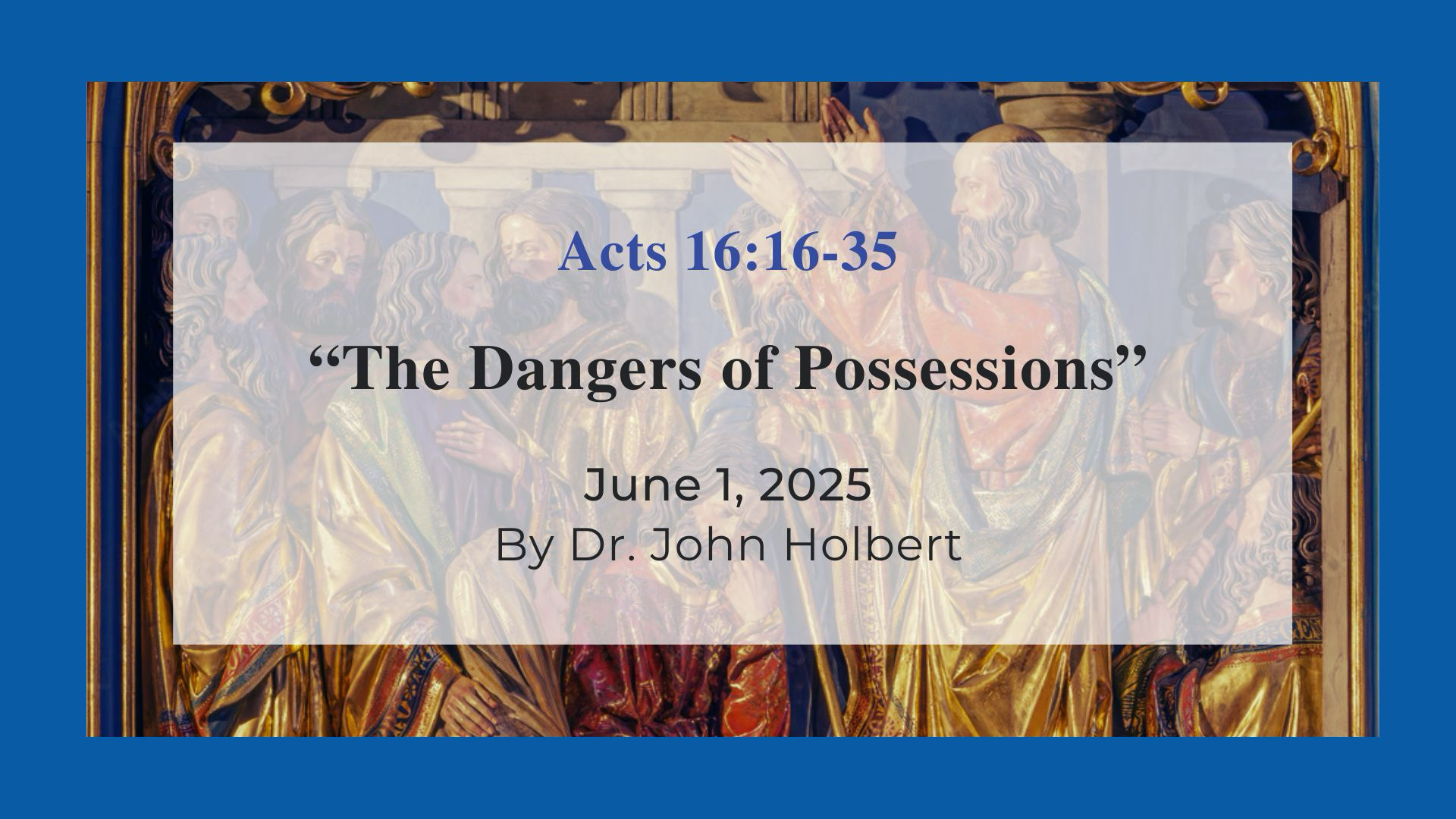The Dangers of Possessions - Reflections on Acts 16:16-35, Easter 7, Year C
by John C. Holbert on Saturday, April 5, 2025

It has long been noted that Luke is especially concerned with the dangers of money and possessions. In both story and parable, Luke focuses again and again on the impact of the use and misuse of money. In his Gospel, he speaks of a “rich fool” who was not ready for an early end to his life, imagining his bigger and bigger barns would increase forever (Luke 12:13-21); in two of the three famous parables of chapter 15, money is the central concern, as the woman finds her lost coin that leads to great rejoicing, and the elder son of the forgiving father whose scattering of his inheritance in the far country forces his ignominious return to the father in search of a meal (Luke 15: 8-32); the parable of the dishonest manager revolves around the misuse of money (Luke 16:1-9); the rich man and Lazurus, demonstrating the very different fates of a heedless rich man and a desperately poor one (Luke 16:19-31); the rich ruler who cannot divest himself of his many possessions for the sake of God’s realm (Luke 18:18-25). And in the book of the Acts, several stories take great concern for money and possessions. That interest is founded on the description of the community of the earliest Christians who, right after their conversion to the faith at Pentecost, “hold all things in common; they would sell their possessions and goods and distribute them to all, as any had need” (Acts 2:44-45).
This community command to share all things was shattered by the tale of Ananias and Saphira, both of whom withhold from the community the proceeds of the sale of their property and, upon the discovery of their greed, are struck down dead at Peter’s feet! (Acts 5:1-11). To the contrary, Barnabas, whose given name was Joseph, followed the commands of the community and brought the money made from the sale of a field to that community (Acts 4:36-37). Now here in the two tales of Lydia and the prophetess with the Pythian spirit, Luke once again contrasts those who are generous and those who refuse to part with their possessions. The wealthy and devout Lydia (whether she is a Jew or merely a Gentile deeply attracted to the “house of prayer,” namely, the synagogue, is not made clear) expresses her complete openness to the word of Paul by offering her house freely for the use of the apostle and his entourage. This is immediately contrasted with the avaricious owners of the female slave girl, who is possessed by the Pythian spirit (this spirit was the one made famous at the Greek oracle at Delphi), and who is the “meal ticket” to her owners’ wealth, as strange and mysterious words come from her mouth, predicting events in the future for the gullible, ever anxious to know more precisely what is in store for them.
However, when the prophetess begins to follow Paul around, her cries become rather different. “These people are the servants of the Highest God. They are announcing to you a way to salvation” (Acts 16:17). This will hardly do, since there is not much money to be made by such theological claims! The woman has been forced to predict future wedding partners, suggestions for the right investments, ideas for successful behavior of all sorts. But not only is the prophetess’s value steeply diminished for her owners, she also, ironically, “wearies” Paul (Luke uses the same verb found at Acts 4:2, where it refers to the Sanhedrin who are in the same way “wearied” by the words of the apostles), and he decides to exorcize the spirit from the girl (Acts 16:18). Well, that makes her completely worthless to her owners, who then drag Paul and Silas to the local magistrates, accusing them of being Jews, thereby tapping into the residual anti-Jewish feelings so common in nearly all parts of the 1st century Roman world. As a result, Paul and Silas are beaten, and imprisoned in the “inside cell,” the one farthest from the prison entrance, and to be absolutely sure they are secure, the jailer “fastens their feet in stocks” (Acts 16:24).
Luke’s deep concern for money and its abuse is hardly an idea that is no longer relevant. By nearly any measure I am a wealthy man. Oh, I am hardly on the level of Elon Musk or Jeff Bezos, to be sure, but when compared with several billion of the world’s inhabitants, living as they do on a few dollars a day, I am not poor. And even as I pass the too many unhoused in my hometown of Los Angeles, it is made abundantly clear that I am wealthy. I have at no time in my life wondered whether I had a place to stay, or food to eat, or prospects of something I hoped to buy. Luke’s concern remains my own. Just how am I to employ the money and possessions I have? Too often, I have not been generous. Too often, I have not taken with enough seriousness the “things” I own or wish to own. I fear I am rather more like Ananias than I am like Barnabas. It is a constant concern of my life. What about you? Are Luke’s issues your issues? At the very least, are they issues that niggle at you, cause you concern, force you to consider more carefully your uses of money? I remain dissatisfied with my answers to these questions, and so it has always been for me. Confession, as it is said, is good for the soul. Yet, I have much to do, as Luke urges me onward in my relationships to money. Among many other gifts the Bible provides, there is the one that causes one to think seriously about the manner of one’s life. So it is for me with this business of money.
